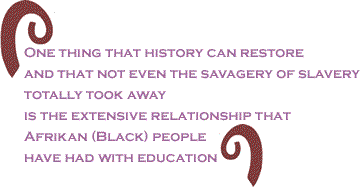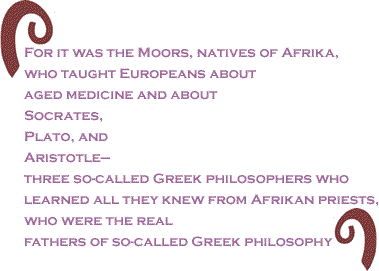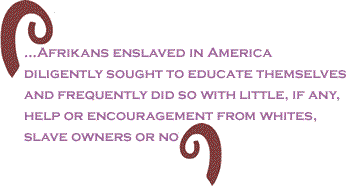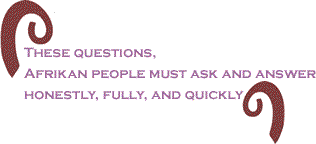
|
|||||||||||||||||||||
 |
|||||||||||||||||||||
 |
|||||||||||||||||||||
 |
|||||||||||||||||||||
 |
|
|
The great Afro-Puerto Rican historian and bibliophile, Arthur A. Schomburg, was absolutely right when he wrote, “History must restore what slavery took away, for it is the social damage of slavery that the present generation must repair and offset.” One thing that history can restore and that not even the savagery of slavery totally took away is the extensive relationship that Afrikan (Black) people have had with education. An unbiased look at the annals of history certainly demonstrates that since time’s beginning such a relationship, and an extremely strong one at that, has existed. Historically, Afrikan people have had a longer relationship with education than have any other people on the face of the globe. This is true for at least two reasons. First, Afrikan people were the world’s first people, they are its oldest people, and all other people came from them. Second, because Afrikan people were the first people to give birth to civilization thousands of years ago, they were also the first to give birth to education, which technically means “rearing”, “upbringing”, or “leading out”. In brief, Afrikans took the world’s first steps in leading humanity out of mind-choking ignorance. Consequently, their efforts resulted in Afrikans being the first people to create the pencil, pen, and paper; astronomy and astrology, math (geometry and algebra, if not calculus) and medicine. In fact, the very numbers and alphabets that are used today are Afrikan, and the world’s first and oldest medical book is Afrikan, too.
Due to their undying love and thirst for education, thousands of years ago Afrikans (Blacks) in Egypt, which is and always has been in Afrika and Afrikan (Black at least in ancient times), established the Grand Lodge of Luxor, the world’s first university. It had virtually all-Afrikan professor-priests, who taught up to 80, 000 students, says one Black scholar, at all grade levels. So advanced was its curriculum, that the Grand Lodge sounds rather 21st century. Divided into five major departments, the curriculum included astronomy and astrology, geography and geology, and philosophy and theology. If it had not been for the Moors, meaning “Blacks”, who ruled Spain for over 700 years (from A. D. 711-1492), the very idea of university life among Europeans (whites) may never have existed at all. For it was the Moors, natives of Afrika, who taught Europeans about aged medicine and about Socrates, Plato, and Aristotle—three so-called Greek philosophers who learned all they knew from Afrikan priests, who were the real fathers of so-called Greek philosophy. The Moors also taught Europeans to take baths, which was seen as a sin by the Europeans before the Moors came and after they were kicked out of Spain the same year that Christopher Columbus made his famous sail “in 1492…across the ocean blue”. Interestingly, the Moors taught Europeans to wear underwear. It was also the Moors or Blacks in Spain who established 70 public libraries and 17 famous universities in the 10th and 11th century when the rest of Europe scarcely had one single public library and only two famous universities. That was at a time in Europe when most Europeans (whites), including their kings, were illiterate and even the kings lived in their houses or barns without windows. Meanwhile, in the fourteenth and fifteenth century, West Afrikan empire of Songhai, namely in the city of Timbuktu, at least one scholar has said that “university life was highly regarded and scholars were greatly respected.” At the center of Timbuktu’s academic life was the University of Sankore, which had Afrikan (Black) professors who were so intellectually sharp that they were qualified to teach at virtually any university in Afrika and Asia at the time. Consequently, students from areas throughout both Afrika and Asia flocked to them to learn from these learned men. As for the Arab (Asians, though often of Afrikan (Black) descent both then and now) would-be professors of that time, they often did not qualify to teach at Sankore because there were not proficient in and knowledgeable enough of the large curriculum that professors at the University of Sankore had to know.
That curriculum also sounds very modern in many respects. It included theology and exegesis, traditions and Malikite jurisprudence (law), grammar and rhetoric and logic, astrology and astronomy, and history and geography. In fact, some of the most treasured of at least 18, 000 or more manuscripts from the ancient University of Sankore were recently on display in Atlanta, Georgia at the Shrine of the Black Madonna Bookstore. According to the flyer that announced the event, from 100,000 to 1,000,000 such manuscripts may exist throughout the world as a salute to Afrika’s and its people’s centuries-old, active participation in literacy, scholarship, and education as a whole. Not even the centuries-old savagery of both the Arab- and European-led enslavement of Afrikan people severed totally Afrikan people’s depthless devotion and determination to educate and free themselves. During chattel slavery in America, despite the ever-present threat of punishment (having one’s fingers cut off, being bull-whipped mercilessly, or brutally killed), Afrikans enslaved in America diligently sought to educate themselves and frequently did so with little, if any, help or encouragement from whites, slave owners or no. In fact, says Black historian Kennell Jackson, the Afrikan American “literacy revolution” of the 19th century “was the greatest expansion of literacy among any population in the world in the nineteenth century.” The preeminent, Afrikan American multi-genius and activist-scholar W. E. B. DuBois goes even further. According to him, the very idea of public schools and public education in America, especially in the American South, at public expense, came from the formerly enslaved Afrikans in the United States after the American Civil War. For the last five centuries, if not more, a white and/or yellow supremacist-led war has been waged against the world’s, widely-spread, (1) billion plus Afrikan (Black) people. One tool that has been used against all Afrikan people everywhere is education in the form of what the Harvard-educated, African American historian-scholar Carter G. Woodson, “the Father of Black History”, called “miseducation”. As such, since, as stated earlier, “education” technically means “rearing” or “leading out”, all (1) billion plus members of the globally-dispersed African World Family (AWF) must both honestly ask and answer for themselves some questions.
Three in number, those questions are as follows: 1)Is the education that both Afrikan people and their children have received or are receiving leading them out of ignorance to enlightenment or is it keeping and making them more ignorant of themselves, the world in which they live, and their all-important, past, present, and future role in it? 2) Does it lead them out of poverty to prosperity or is it keeping and making them even more poor? 3) Is it leading them out of powerlessness to being powerful by showing them how to handle power or is it, like the Bible-toting missionaries of the past and the present, who go into Afrika and Afrikan (Black) communities around the world - stealing and/or draining the physical and mental, economic and cultural, and even spiritual wealth of Afrika and its people around the globe - giving them little, if anything, in return, excepted maybe the Bible, which Afrikans, some historians say, directly or indirectly wrote? In short, does education teach the world’s Afrikan children and people as a whole how to produce or to consume? Does it stress that they unite or stay divided? Does it show them how to lead, or how to follow others, namely white and yellow supremacists, who, overwhelmingly, seem to lead them presently and who, historically, have meant them no good—nothing but long-lasting misery? These questions, Afrikan people must ask and answer honestly, fully, and quickly. Time is of the essence. They must re-educate themselves in their own ageless and positive wisdom of the past, as well as gain important skills and know-how from others, bring it into the here and now, and use it to improve, first and foremost, their plight (geopolitically, financially and educationally, spiritually and educationally, and universally as one people) and that of generations to come and the plight of the blood-thirsty world, which, it seems, they must civilize and educate once more. HAWK(J. D. Jackson) is priest, poet, journalist, historian, and African-centered lecturer and a middle school teacher and part-time university history instructor. He can be reached via email at [email protected]. |
|
| Home | |
Your comments are always welcome. Visit the Contact Us page to send e-Mail or Feedback or Click here to send e-Mail to [email protected] e-Mail re-print notice
If you send us an e-Mail message we may publish all or part of it, unless you tell us it is not for publication. You may also request that we withhold your name. Thank you very much for your readership. |
|
| November 16, 2006 Issue 206 |
||||||||||||||
|
||||||||||||||
 |
||||||||||||||
|
||||||||||||||
| Printer Friendly Version in resizeable plain text format | ||||||||||||||
 |
||||||||||||||
 |
||||||||||||||
 |
||||||||||||||
 |
||||||||||||||
| |
||||||||||||||
| |
||||||||||||||






























